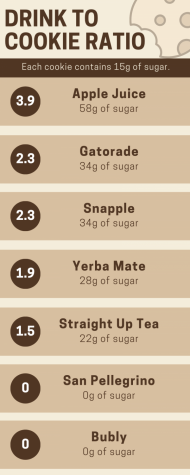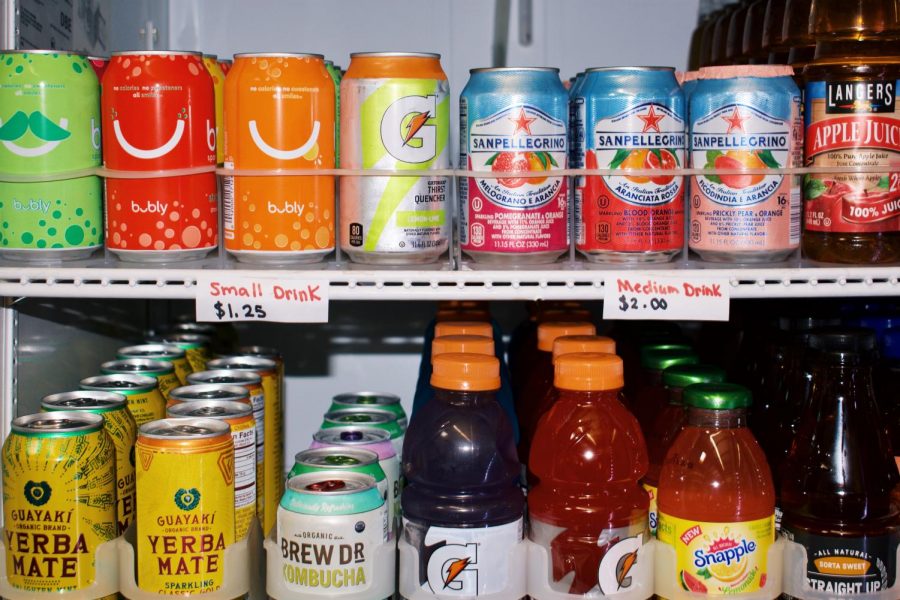Sugar Rush: A Close Look at Drinks in the Cafeteria
The La Salle cafeteria offers a range of drink options — some contain more sugar than students may realize.
December 11, 2019
While the drinks in our school cafeteria may seem harmless at first, students who get a drink from the cafeteria each day may end up consuming over three times the daily suggested sugar intake recommended by the American Heart Association.
Children should be consuming about six teaspoons of sugar per day or less, but many of the drinks for sale in La Salle’s cafeteria contain much more than this.
Taking in large amounts of sugar can have serious impacts on an individual’s health. Sugar can cause high blood pressure, high cholesterol, high triglyceride levels, and heart disease.
Today’s average American consumes 152 pounds of sugar annually, according to Dr. Mark Hyman, founder of the UltraWellness Center. Dr. Hyman’s book, “Food: What the Heck Should I Eat?”, is referenced throughout La Salle teacher Ms. Caitlin Hudson’s Health 2 class.
In Dr. Hyman’s book, he writes that sugar-sweetened beverages are the main source of added sugar in the American diet, and that those who consume the most sweetened drinks have the highest rates of obesity, heart disease, diabetes, and cancer.
We are surrounded by sugar — even in the foods we may not recognize as particularly sweet.
In La Salle’s cafeteria, Food Services Manager Ms. Kim McCarthy and her team work together to decide which drinks are offered. She said that in order to decide what is sold on the cafeteria shelves, they “try to get feedback from [students, and] we try to provide three different price ranges … If it sells, then we can keep it, [but] if it doesn’t sell we will probably move on to something else to put in that spot.”
Ms. Pamela Matteson, who also works in the cafeteria, collects information from students in the lunch line about what they want. This is how Yerba Mates, a popular drink choice at La Salle, were recently brought into the cafeteria.
Yerba Mates have 28g of sugar, which is the same amount of sugar as 1.9 chocolate chip cookies (assuming that each cookie contains around 15g of sugar, which is the average amount for a chocolate chip cookie).
“We try to have things that [do] not [contain a lot of] sugar … But [the ones with sugar are] the ones that sell,” Ms. McCarthy said. “[For example,] apple juice is a very hot item.”
The apple juice in the cafeteria contains 58g of sugar, which is equivalent to eating about 3.9 cookies.

There are some low-sugar options in our cafeteria, such as Bubly sparkling water and kombucha, whose sugar contents are equal to 0 cookies and 0.7 cookies, respectively.
According to Ms. McCarthy, neither soda nor water is allowed to be sold in the cafeteria. Sodas are not allowed to be sold due to the high amounts of sugar in them, although many of the drinks in the cafeteria have similar levels of sugar. Water isn’t allowed to be sold because of the amount of plastic waste it creates, which is why there are water fountains around the school. Students are encouraged to bring reusable water bottles to school to utilize this resource.
Another popular drink option is Gatorade. The “cool blue” flavor contains 34g of sugar, which is equivalent to eating around 2.3 cookies.
“The Gatorades are here because they have electrolytes in them,” Ms. McCarthy said. According to the National Library of Medicine, electrolytes help with reducing muscle cramps, balancing the amount of water in your body, and moving nutrients to your body’s cells.
Dr. Hyman said that “most people don’t need to ‘replenish’ electrolytes after a workout. Unless you are playing hardcore sports in hot conditions, neither do you. You can actually buy liquid electrolytes to put in your water, which actually work better and also contain none of the sugar or dyes.”
Dr. Hyman said that the only thing we need to drink to be healthy is water. People often consume drinks without realizing the amount of sugar that may be hiding within its contents, but according to Dr. Hyman, drinks containing sugar, artificial sweeteners, and chemical adders should be avoided.
“Sugar is poison at the right dose,” he said.





